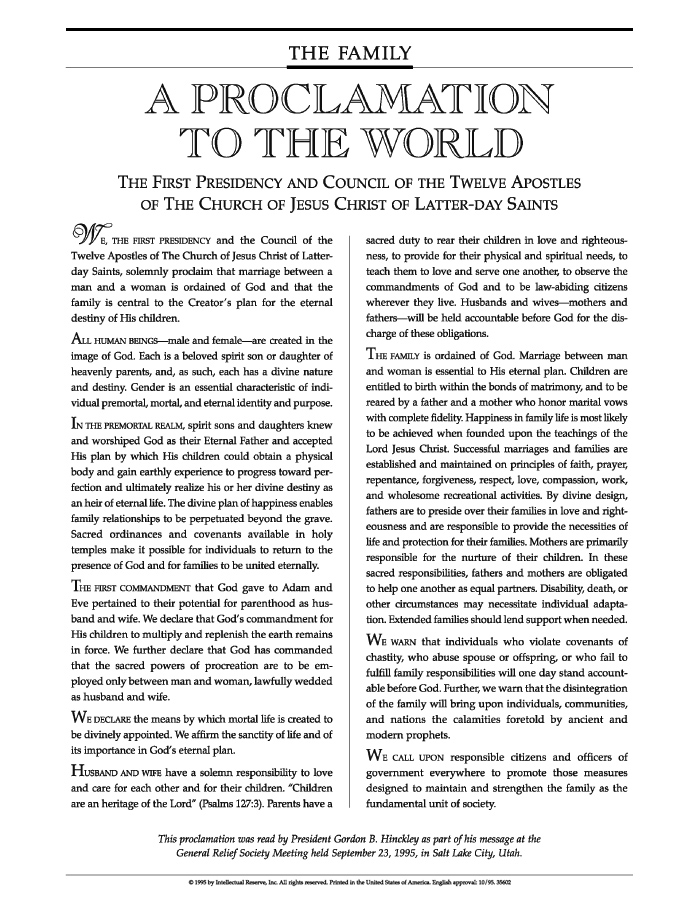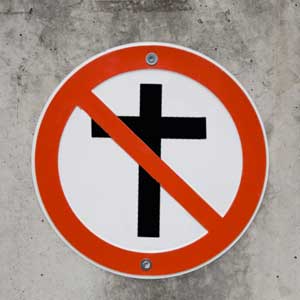There’s been a lot on my mind when it comes to people taking issue with the doctrine of eternal families. Especially when it comes to people sitting in church and feeling somehow harmed because of the “The Family: A Proclamation to the World.” I guess you can file this post under tough but tender love. My central point is that the doctrine of families applies to everyone at all times, including those who may feel like it doesn’t.
A few things right off the bat.
No, the Proclamation has not been canonized. But that doesn’t make it any less scriptural. It wasn’t voted on by the body of the church. But that does not mean that God didn’t direct it. No, it is not a part of the temple recommend interview. But sustaining prophets in their priesthood keys is. It’s not a binding political document. But it is doctrinally binding and supported by other doctrines taught across this and previous dispensations to be rejected at our own risk (and the risk of those who look to our testimonies).
So then, seeing that the doctrine taught in the Proclamation is of God, it follows that if the doctrine of families hurts this moment, then it is not the church, the Proclamation, or God that needs to change. The change necessary for us to obtain peace consists in coming to Christ with a broken heart and contrite spirit to learn of the peaceable things of the kingdom and have our perspectives changed by him. There are things we need to allow the Lord to change in us.
The Doctrines in the Proclamation
The text in the Proclamation does not reflect a new concept. Each statement is a reiteration of existing doctrines.
Our Heavenly Father, an exalted and perfected man of flesh and bones, father of Christ (Jehovah) lives in a family unit after which he patterned the family of Adam and Eve. That includes the fact that we have a Mother. Such a doctrine has been part of modern teaching since the restoration.
In addition, we have plenty of reason to believe it has been a part of ancient teaching, not actively discussed, much like the restrictions to the lesser Law of Moses and contraction of greater priesthood responsibilities, or even suppressed by certain kings.
The order of the family of Adam was given as an archetype of our heavenly family. It follows that if family relationships sealed by the Holy Spirit of Promise are to be eternal, and exist as the key for exaltation, and we follow the example of Christ, who does nothing except was he sees the Father do, then we are on a course to become like God in our relationships, ergo, God the Father is a literal Father as he instituted the beginning pattern of families to be.
The Hebrew name for God “Elohim”, denoting “greatest of all gods” itself is a plural noun. As we follow the same path, our identities as God’s children, whose eternal potential is currently in embryo–our identities as eternal beings, like his, are inextricably tied to our identities as Husbands and Wives, Mothers and Fathers.
We don’t know much about the creation of spirits. But we can make some inferences. The First Presidency of Joseph F Smith affirmed that:
“…man, as a spirit, was begotten and born of heavenly parents, and reared to maturity in the eternal mansions of the Father,” and man is the “offspring of celestial parentage.” They also include that “all men and women are in the similitude of the universal Father and Mother and are literally the sons and daughters of Deity.” (Man: His Origin and Destiny, pp.348-355.)
At the very least, we understand that the act of creation of spirits is a co-creative act between Father and Mother, hence why those who make the decision of their own accord not to choose an eternal companion are left without this opportunity.
This is why God created male and female bodies to house spirits, as we existed in spirit as sons and daughters, male and female, because all things were created spiritually before they were physically on the earth.
Thus gender, marriage, and the role of creation are all based upon this divinely appointed pattern. That is the doctrine.
So Why Does it Hurt?
First and foremost, in the case of my friends and family members who struggle with this, the pain comes because someone cannot see right this minute how this eternal pattern applies to them. All they see is that they are different somehow–biologically stuck between gender, attracted to someone of the same sex, divorced, single, etc. They see happy families to which this pattern does apply, and it only exacerbates the differences they see. In short, they forget the full breadth of doctrine as it applies to families. One might even call it a keyhole view, rather than focusing on what a friend called “The other 50,000 or so testimonies.”
But just as missing a loved one and longing for their presence does not necessarily imply that they should never be away from you or that the reasons they are away are wrong, the temporal pain of being the exception right now does not imply that the pattern is somehow wrong. The Proclamation can be 100% correct and still hurt.
The real risk of this pain comes in assuming that because we aren’t party to some blessings right here and now pertaining to this pattern, or because we have certain temporal complications in life that we are somehow justified in ignoring or criticizing the doctrine.
We’re not.
Furthermore, it won’t help anyone get closer to the Savior to insist that the eternal pattern he died to maintain in the hereafter is wrong.
Pain persists, I feel, because of a few main contributors:
1) Damaging ideas about the timing of blessings. Nowhere in our canon does it restrict the reception of blessings to actions in this life only. Every blessing for which we are worthy will be given us. Church members can get caught up in thinking others will never receive a blessing because of their behaviors right now, and that sins are met with irrevocable condemnations. That’s not our doctrine. Others get so offended because they think a benevolent God should give them certain blessings in this life, and that making them wait for blessings in the next life is cruel.
So don’t assume someone is set forever in the state they are in right now. But also understand that some blessings may not come in this life. The greatest figures of our scriptures did not receive the measure of the blessings promised to them until after they died. Abraham is the prime example. His blessings of being a “great father” were all posthumously received. And if we are to be in company with these people of Abraham’s caliber, I don’t see how we could feel comfortable unless we have exhibited at least some measure of the same faith and determination.
2) Not realizing that repentance is always available, and that there is some measure of repentance, change, and learning available after death.
The fact that we perform ordinances in temples on behalf of the dead that they may reject shows we have the capacity to change after this life. Although the same spirit that possesses our bodies here will continue, there is a point at which the chemicals and biological processes and imperfections of the temporal body will no longer apply, and we may have clearer understandings of how perfectly the pattern of families DOES apply to us.
3) Not remembering that the resurrection returns us to the perfection of our spirits, male and female, with God-intended design, free from the things that have gotten in the way.
Joseph F. Smith noted what was taught by other leaders: “We will meet the same identical being that we associated with here in the flesh—not some other soul, some other being, or the same being in some other form, but the same identity and the same form and likeness, the same person we knew and were associated with in our mortal existence, even to the wounds in the flesh. Not that a person will always be marred by scars, wounds, deformities, defects or infirmities, for these will be removed in their course [per Alma 42], in their proper time, according to the merciful providence of God. Deformity will be removed; defects will be eliminated, and men and women shall attain to the perfection of their spirits, to the perfection that God designed in the beginning” (Joseph F. Smith, Gospel Doctrine, 23).
If all these things make the temporal frustrations we face right in the end, then what is really painful about the doctrine? I think it’s only when we are shortsighted and get marred by the “cares of the world” that our vision begins to dim.
So What About The “Exceptions?”
That leaves the question here: for those to whom the pattern does not APPEAR to apply at this moment, but to whom the eternal pattern will and does apply, what are they to do?
Remembering that God’s work is to “Bring to pass the immortality and eternal life of man,” (i.e. bring us to the joy and state in which he enjoys his greatest happiness), we should recognize that, according to him:
“Behold, this is your work, to keep my commandments, yea, with all your might, mind and strength.”
Whatever he asks us to do, whatever blessing it appears we are forgoing now, and whatever pain may be experienced by feeling like the pattern of families doesn’t apply right now, creating an alternate, temporal version of it that won’t endure is NOT what our work is about, and it won’t lead us to the greatest happiness in the long run. Whatever pains there are, you can bet that Christ paid the price for every step that hurts. Every hour of obedience which he requires is repaid ten-fold. All losses are made up. So if he asks it, then it must be extremely important for our ultimate good, because if it weren’t, he would be suffering needlessly.
Not knowing HOW the plan applies right now–these are the types of temporal unknowns the atonement was designed to heal. It is that relationship with Christ that the gospel is designed to strengthen first. Detaching ourselves from the vine because we’re not sure what direction the vine will grow this instant in favor of the pursuit of some other vine will always leave us dried and lifeless at some point.
The kind of perfection God expects is for us to be “whole” or “complete” (Greek-telios). Wholeness only comes in the atonement and grace of Christ. The fear of the unknown is swallowed up in knowing we have access to he who knows all.
Families truly are forever. But when forever starts may be different depending on temporal circumstances. And at some point, we know what the end result will be.
There are just a few things to figure out in the meantime. Until then, our responsibility is simple.






